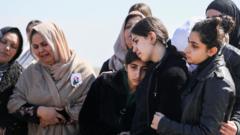As the aftermath of Assad's regime continues to unravel, Alawite communities in Syria witness severe violence with hundreds of killings reported. While some local residents call for peace and unity, tensions remain high as the threat of retaliation looms large.
Alawite Communities in Syria Face Terror Amidst Ongoing Violence

Alawite Communities in Syria Face Terror Amidst Ongoing Violence
Reports of mass killings and horror unfold as Alawite families face violence and looting in Syria's coastal regions.
Residents of the coastal provinces of Latakia and Tartus in Syria are reeling from an outbreak of violence that has reportedly left hundreds dead, particularly among Alawite families. This surge in violence follows the recent downfall of former president Bashar al-Assad and escalated tensions as reports of revenge killings circulate.
Witness accounts describe horrid scenes of looting and mass killings; families are found gunned down in their homes. In Hai Al Kusour, a neighborhood predominantly inhabited by Alawites, residents recounted witnessing bodies strewn across the streets while families desperately sought refuge. One local man, Ayman Fares, escaped death due to his previous imprisonment for criticizing Assad’s regime. However, he bore witness to horrific violence, describing how raiders targeted civilians indiscriminately.
The UK-based Syrian Observatory for Human Rights documented over 740 civilians who lost their lives in recent clashes across the coastal cities of Latakia, Jableh, and Banias, in addition to hundreds of security personnel from the Assad era. Official confirmation of these figures remains unverified.
Amidst this turmoil, Syria's interim leader has called for unity in the face of escalating violence. Residents like Ali, who fled for safety with his family, shared how Sunni neighbors stepped in to protect Alawite families amidst the chaos. He emphasized the long-standing coexistence among Alawite, Sunni, and Christian communities that had prevailed until now.
The violence, ignited by resistance from Assad loyalists who refused to disarm, has also seen formation of new rebel groups, complicating the situation further. Former security officials of the Assad regime are reportedly organizing a rebellion, causing fragmented reactions within their communities.
Despite calls for justice, many remain frustrated with the interim government's handling of security issues, pointing to a lack of strategy in addressing the fallout from Assad’s regime. With poverty affecting over 90% of the population and thousands of law enforcement personnel left unemployed, the potential for further unrest looms large.
Both the Sunni majority and the Alawite minority find themselves caught in a web of suspicion and retaliation, as residents in various cities voice their dissent over atrocities committed during the Assad regime. Calls for vengeance reverberate, even as the interim president appeals for calm. The volatile mixture of historic grievances, poverty, and armed factions poses a significant threat to the fragile peace and stability in Syria's future, as leaders grapple with the challenges of seeking justice while ensuring the protection of all citizens.




















